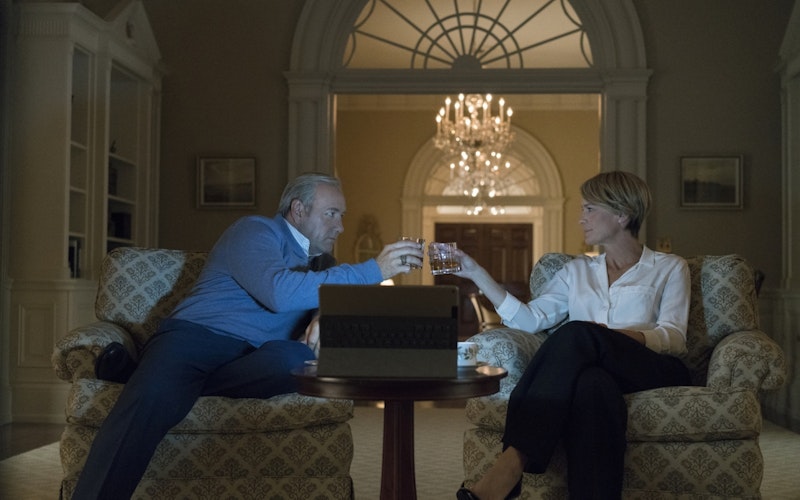
TV
The Helpless Horror of House of Cards
When I watch House of Cards I feel trapped. I’m trapped on the wrong side of the screen. I’m roaring inside my head at the ignorance of the unsuspecting characters who are being manipulated by Frank and Claire Underwood, the exquisitely seductive First Family played by Kevin Spacey and Robin Wright.
The Underwoods are twisted at their core. They parcel out horror in a matter-of-fact, genteel way that feels like they’re talking to a neighbor about the weather. House of Cards fits the cliche: it’s so terrible you cannot turn away. This irresistible appeal is why Netflix will usher in its fifth season of the wildly popular political drama next week.
The masterful use of soliloquy is part of the show’s brilliance and why it’s often described as Shakespearean. As the viewer, it feels like you live with the Underwoods. Frank talks to you like a friend. He considers you smart and informed, on his side of managing an ignorant populace. He shares his atrocities with you and takes a break from murder and violence just long enough to wink and offer an anecdote. At times you may even begin to like him, or at least identify with him. It’s a queasy feeling.
Spacey can deliver soliloquies like few other actors. He’s a genius at speaking directly to the audience and keeping us glued to the screen. Yet the dark lighting and the occasional close-ups, which betray the slightest flinch on Underwood’s face, tell us he cannot be trusted. As the viewer, you are given knowledge and insight, but you cannot use it to save the peripheral characters you begin to care for throughout the series.
None of us is immune to this corruption.
A House of Cards fan must wrestle with both this trapped, anxious feeling and the nagging question, “Could this really happen?” At the conclusion of each episode you cannot help but take a breath and begin to look around at our own political realities. You notice both the subtle and overt abuses of power that happen in the real world and you wonder: which side of the screen am I really on? Who is talking to me (or manipulating me) for the sake of amassing their power? In a Washington Post interview, House of Cards showrunner Beau Willimon said that while clearly the storylines on the series are exaggerated, “More often than not, people from Washington have said time and time again it’s one of the more accurate portrayals of Washington.”
Political leadership around the world and throughout history has been marked by power-hungry influencers whose true motives are difficult to know. In Playing God, Andy Crouch writes that, “Power at its worst is the unmaker of humanity—breeding inhumanity in the hearts of those who wield power, denying and denouncing the humanity of the ones who suffer under power.” To be certain, there have been many a martyr and leader who led with great humility and a detachment from the allure of power, but this seems to be the exception to the rule. The Bible holds a vast collection of abuses of power by kings, queens, politicians, and wannabes. Within its pages we read of real-life Frank Underwoods with blood on their hands and we can only holler at the screen.
House of Cards captures the thirst for power and control that has eroded the soul of humanity and fueled terror for millennia. Leadership around the world and throughout history has been infected by corruption and the influence of selfish motives. Of course, none of us is immune to this corruption. And so House of Cards poses another chilling question: “What would I do with that sort of power?” In the world of Netflix, we’ll soon find out what terror the Underwoods will inflict next. In our own lives, may we pray, work, serve, advocate, listen, speak, and live in the way of Jesus, who used his eternal power to serve and save others.
Topics: TV, Culture At Large, Arts & Leisure